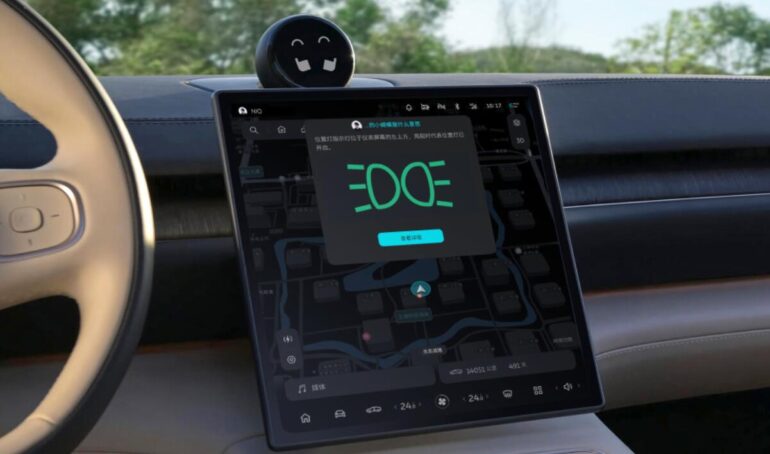- Nio launches NOMI GPT, an AI-driven virtual voice assistant for enhanced passenger-vehicle interaction.
- NOMI GPT utilizes advanced AI technology, specifically the Generative Pre-trained Transformer (GPT), to deliver dynamic responses.
- The virtual assistant is compatible with Nio vehicles equipped with the Banyan system, offering a wide range of features, including encyclopedic quizzes, chat capabilities, and vehicle function adjustments.
- NOMI GPT represents a significant advancement in the automotive industry, catering to evolving user expectations for personalized and intelligent interactions.
- Nio emphasizes continuous innovation, with plans to further enhance NOMI GPT through ongoing development efforts and user feedback.
Main AI News:
In a strategic move aimed at revolutionizing the passenger-vehicle interaction experience, Nio has officially unveiled NOMI GPT, a cutting-edge virtual voice assistant powered by artificial intelligence (AI) technology.
The electric vehicle (EV) pioneer made headlines today with the launch announcement of NOMI GPT, which is set to enhance the user experience for vehicles equipped with the innovative Banyan system.
Banyan, a sophisticated system integrated into Nio’s NT 2.0-based models, marks a significant advancement over its predecessor, the NT 1.0-based Aspen system.
At its core, GPT stands for Generative Pre-trained Transformer, a groundbreaking technology that predicts the likelihood of the next word in a sequence, thus enabling NOMI GPT to dynamically generate responses based on probability distributions.
As the global discourse increasingly revolves around ChatGPT, numerous Chinese enterprises have ventured into this domain, leveraging AI to propel virtual assistants to new heights.
Nio emphasizes that the integration of AI, particularly the powerful ChatGPT model, empowers NOMI GPT to express nuanced emotions and exhibit heightened intelligence, fostering a more immersive user experience.
NOMI GPT boasts a plethora of features, including encyclopedic quizzes, seamless chat interactions, and the ability to control various vehicle functions, catering to diverse user preferences and needs.
Moreover, the enhanced virtual assistant excels at answering inquiries spanning a wide array of topics, ranging from science, history, and art to movies, music, and vehicle-related queries.
Beyond informational capabilities, NOMI GPT enables users to execute commands such as adjusting ambient lighting and configuring shortcut commands, thereby augmenting convenience and customization options.
In a statement released via its mobile app, Nio underscores the transformative potential of NOMI GPT, which serves as a unifying element across the company’s product portfolio, services, and user community, delivering a seamless and enriching AI-driven experience.
Looking ahead, Nio affirms its commitment to continuous innovation, with plans to further enhance NOMI GPT through ongoing development efforts, introducing additional features and functionalities to meet evolving user expectations.
Notably, NOMI represents one of the pioneering virtual voice assistants in China, initially introduced by Nio in 2017 alongside the launch of its inaugural production car, the ES8, epitomizing the company’s ethos of fostering personalized interactions through technology.
Previously, NOMI primarily fulfilled tasks such as media playback, navigation assistance, phone calls, photography, and locating battery swap stations, laying the foundation for its evolution into the sophisticated NOMI GPT.
During an earnings call on March 5, William Li, Nio’s founder, chairman, and CEO, outlined the strategic significance of leveraging AI models to power NOMI GPT, underscoring its role in enhancing product competitiveness.
Subsequently, on March 11, Nio initiated the recruitment process for beta testers of NOMI GPT, signaling the company’s proactive approach to refining and optimizing the virtual assistant in collaboration with its user base.
With 132 version iterations and over 2,000 features introduced, the latest iteration of NOMI underscores Nio’s unwavering dedication to innovation and user-centric design, cementing its position at the forefront of AI-driven automotive technology.
Conclusion:
Nio’s introduction of NOMI GPT underscores a significant advancement in the automotive market, signaling a shift towards AI-driven solutions for enhancing user experience and product competitiveness. The integration of advanced AI technology not only augments passenger-vehicle interaction but also positions Nio as a frontrunner in leveraging cutting-edge technology to meet evolving consumer demands. This move sets a precedent for other automotive players to invest in AI-driven innovations to stay relevant and competitive in the rapidly evolving market landscape.

